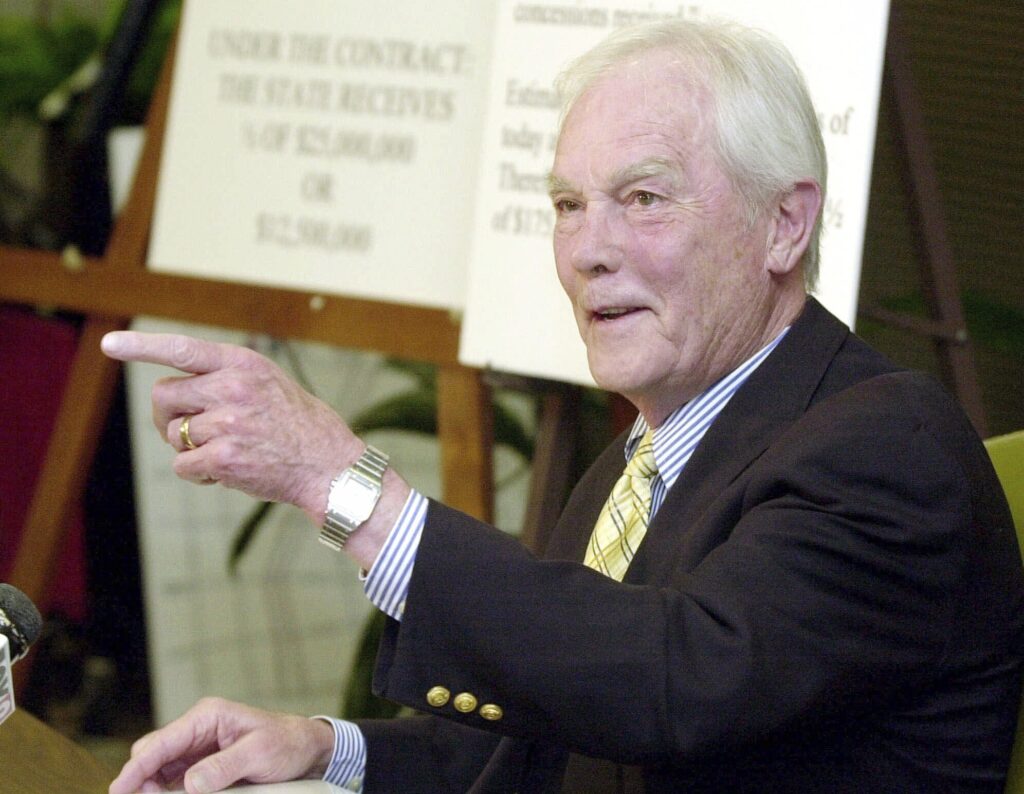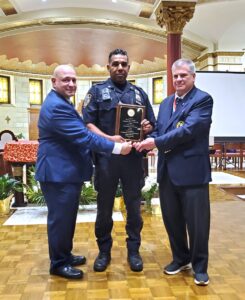From Associated Press
NEW ORLEANS (AP) — Harry Connick Sr., who was New Orleans’ district attorney for three decades and later faced allegations that his staff sometimes held back evidence that could have helped defendants, died Thursday at age 97.
Connick died peacefully at his home in New Orleans with his wife, Londa, and children — Suzanna and musician and actor Harry Connick Jr. — by his side, according to an obituary distributed by Harry Connick Jr.’s publicist. A cause of death was not provided.
Connick dethroned an incumbent prosecutor, Jim Garrison, in a 1973 election. He won reelection four times, and successfully built biracial support as the city’s political power base shifted to African Americans.
Connick remained undefeated and retired in 2003. But he was later dogged by questions about whether his office withheld evidence that favored defendants. The issue came to the forefront with a 2011 U.S. Supreme Court ruling in a lawsuit filed by John Thompson, who was exonerated after 14 years on Louisiana’s death row for a killing he didn’t commit.
In a 5-4 decision, the high court overturned a $14 million award for Thompson, ruling that the New Orleans district attorney’s office shouldn’t be punished for not specifically training prosecutors on their obligations to share evidence that could prove a defendant’s innocence. In a scathing dissent, Justice Ruth Bader Ginsburg decried “Connick’s deliberately indifferent attitude.”
The issue was revived in 2014 when a murder conviction against Reginald Adams, imprisoned for 34 years, was reversed. Attorneys for the Innocence Project New Orleans presented evidence that detectives and prosecutors in the case had withheld critical information before Adams’ 1990 conviction.
Adams later received $1.25 million in a court settlement.
Connick repeatedly declined to comment on the cases. However, in 2012 he defended his legacy in an interview with The Times-Picayune tinged with sports references.
“My reputation is based on something other than a case, or two cases or five cases, or one interception or 20 interceptions. Look at the rest of my record. I have more yards than anybody,” Connick told the newspaper.
He added: “I have to look at myself and say this is who I am. This is what I’ve done. Perfect? No. But I’ve done nothing to go to confession about in that office. At all.”
New Orleans’ current district attorney, Jason Williams, expressed condolences to Connick’s family.
Connick, a Navy veteran who served in the South Pacific during World War II, nurtured his son into becoming a jazz piano prodigy, partly by arranging for the boy to sit in with New Orleans Dixieland players and legends such as pianist Eubie Blake and drummer Buddy Rich.
Connick was born March 27, 1926, in Mobile, Alabama, and moved to New Orleans with his family at age 2. By the 1970s, he had become a part of the city’s political fabric.
In 1973, Connick was a little-known federal prosecutor when he took on Garrison, a three-term district attorney whose fame stretched far outside New Orleans.
“I worked as a legal aid attorney for over three years, and I learned firsthand about the operation of Garrison’s office,” Connick said in a 2001 interview. “I decided I could do a better job than Jim Garrison.”
Known as “Big Jim,” the 6-foot-7 (201-cm) Garrison gained worldwide publicity when he unsuccessfully prosecuted a New Orleans businessman in connection with the assassination of President John F. Kennedy and insisted that a massive cover-up was taking place regarding the assassination.
After Garrison lost his big case, Connick challenged him. Connick ran as a reformer and won by just over 2,000 votes.
In the 1970s and ’80s, Connick led crackdowns on prostitutes and used 19th century laws to shut down adult bookshops in the French Quarter.
In the ’90s, anti-capital punishment groups attacked Connick for his insistence that prosecutors seek the death penalty in most first-degree murder cases.
And Connick learned firsthand about being a defendant: Federal prosecutors charged him in 1990 with racketeering and aiding a sports-betting operation. The indictment alleged that Connick returned betting records to a convicted bookmaker who wanted the records to collect gambling debts.
Connick was acquitted, then won his fourth election the same year.
.

 Coney Island casino opponents respond to city council’s vote to approve rezoning area
Coney Island casino opponents respond to city council’s vote to approve rezoning area  Officer honored for community involvement during Mass for American Independence Day Parade
Officer honored for community involvement during Mass for American Independence Day Parade